Blog
July 22, 2014
“SAFINA” the Ark
By Professor Markus Borner, PhD
Institute of Biodiversity, Animal Health and Comparative Medicine, University of Glasgow.
Markus Borner was a contemporary of the German Conservationist Professor Bernard Grzimek in the late 1970s, and was instrumental in the early days of establishing Rubondo Island as a National Park. He recently revisited Rubondo, and here he shares his memories of the old days, coupled with his experience of the contemporary camp.
Images © Marcus and Felix Borner
“Safina” or “Ark” was the name of the old diesel boat with which I reached Rubondo for the first time. It was more of a torture chamber as its exhaust was long gone and 12 hours on the lake in horrendous noise made me nearly jump into the water – not even thinking about crocodiles anymore.
An ark for endangered animals, which was the vision the German Conservationist Prof Bernhard Grzimek had when he first “discovered” the Island together with a friend from the Game Department from Mwanza. He fell in love with the forested Island in Lake Victoria, its remnants of the central African forests, its beaches and its animals. He managed to convince his friend Julius Nyerere to make it a National Park and promised to help with its build up and maintenance. So when in 1977 the Tanzanian Parliament raised the status of Rubondo Island to National Park, Grzimek sent me and my wife Monica to help as promised.
35 years ago, as much as today, the Island was true to its promise of a postcard picture dream island. It had been somehow protected since German colonial times, first as a Forest Reserve then from 1966 as a Game Reserve. But for us new arrivals it was not just a wonderful and lovely wilderness, it was also isolated, remote and inaccessible. Together with The Chief Park Warden from Tanzania National Parks, Samwuel Maganga, we lived in a tiny house close to where the Parks guesthouses are today. The rangers lived with their families in small corrugated iron sheet boxes, the old rusty diesel boat was the only link to the mainland, no power, no fridge and “shopping trips” to Mwanza were a major undertaking and happened only every two or three months. The only link to the rest of the world was a short wave radio to Serengeti where Samwuel called every morning his: “Mamba” from “Nzohe” – Do you read?” Mostly nobody read anything.
The simple life had its great advantages and our small family with little Felix and Sophie lived for six years a bit like the “Family Robinson”. Installing a well with a hand pump to provide water in the house was a major achievement; baking our own bread over the fire in a metal tin got better and better; building the first patrol boats by cutting the back of a poacher canoe and put an outboard on was a huge advance for the protection of the island and its wildlife; lighting the kerosene lamps and trying to get the old Chinese carburettor lamp going was an evening ritual. Best of all was the absence of all the hectic-ness and pressures we have now with email and telephone. When we had a problem we wrote a letter on our ancient “Hermes Baby” sent it to Germany and when we eventually got the answer three months later we had no idea anymore what the original problem had been.
But maybe it was remembering this very simple – and sometimes difficult – lifestyle we had on the Island that made my recent stay at the Rubondo Island Camp of Asilia Africa such a wonderful experience. The Island was as brilliant as ever, the hippos and crocodiles as exciting as before, the forest still full of elves and trolls (and sitatungas and bushbucks of course), the bird life with species from the savannah and the equatorial forests splendid, the walks in the forest as exciting – but boy – the lifestyle! It was just amazing. The camp is in the most spectacular bay that I remember choosing for a possible camp many years ago. The feeling of the romantic dream island has been well preserved and the luxury cabins well hidden. I was thinking of our past daily diet of fish, rice and beans and beans, rice and fish when we were spoiled with delicious meals at the camp. Janine and Henk pampered us to no end, already knew a lot about the island and shared our excitement to be able to work in such a wonderful place. Henk is obviously a very dedicated fisherman and knows where to find his fish but I did not dare to tell him that my Nile Perch record had been an 87-kilo monster, albeit caught not like a great sportsman, but on a super strong line.
On an evening cruise with a G&T I managed to leave the world behind me thankful that Rubondo Island is not just a wonderful dream in my past but still a place where we can feel part of nature and find something that links us human beings to trees, water and wild creatures and makes us happy.
I shall be back!
Markus Borner, June 2014
![]()

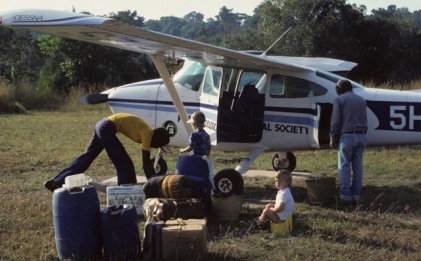
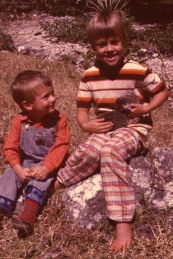
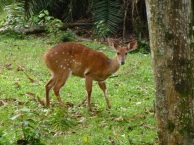
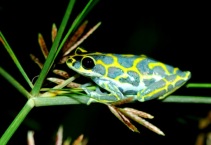
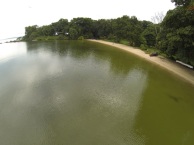
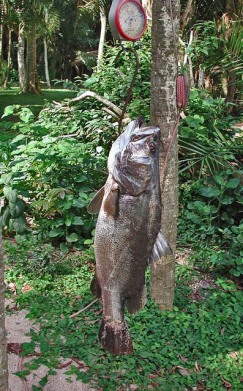
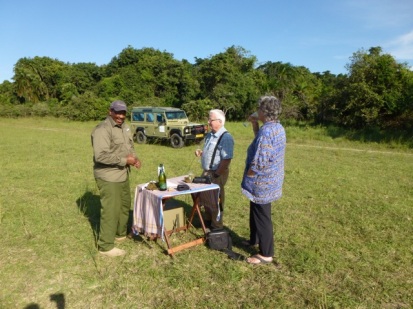




































Add comment
By Professor Markus Borner, PhD
Institute of Biodiversity, Animal Health and Comparative Medicine, University of Glasgow.
Markus Borner was a contemporary of the German Conservationist Professor Bernard Grzimek in the late 1970s, and was instrumental in the early days of establishing Rubondo Island as a National Park. He recently revisited Rubondo, and here he shares his memories of the old days, coupled with his experience of the contemporary camp.
Images © Marcus and Felix Borner
“Safina” or “Ark” was the name of the old diesel boat with which I reached Rubondo for the first time. It was more of a torture chamber as its exhaust was long gone and 12 hours on the lake in horrendous noise made me nearly jump into the water – not even thinking about crocodiles anymore.
An ark for endangered animals, which was the vision the German Conservationist Prof Bernhard Grzimek had when he first “discovered” the Island together with a friend from the Game Department from Mwanza. He fell in love with the forested Island in Lake Victoria, its remnants of the central African forests, its beaches and its animals. He managed to convince his friend Julius Nyerere to make it a National Park and promised to help with its build up and maintenance. So when in 1977 the Tanzanian Parliament raised the status of Rubondo Island to National Park, Grzimek sent me and my wife Monica to help as promised.
35 years ago, as much as today, the Island was true to its promise of a postcard picture dream island. It had been somehow protected since German colonial times, first as a Forest Reserve then from 1966 as a Game Reserve. But for us new arrivals it was not just a wonderful and lovely wilderness, it was also isolated, remote and inaccessible. Together with The Chief Park Warden from Tanzania National Parks, Samwuel Maganga, we lived in a tiny house close to where the Parks guesthouses are today. The rangers lived with their families in small corrugated iron sheet boxes, the old rusty diesel boat was the only link to the mainland, no power, no fridge and “shopping trips” to Mwanza were a major undertaking and happened only every two or three months. The only link to the rest of the world was a short wave radio to Serengeti where Samwuel called every morning his: “Mamba” from “Nzohe” – Do you read?” Mostly nobody read anything.
The simple life had its great advantages and our small family with little Felix and Sophie lived for six years a bit like the “Family Robinson”. Installing a well with a hand pump to provide water in the house was a major achievement; baking our own bread over the fire in a metal tin got better and better; building the first patrol boats by cutting the back of a poacher canoe and put an outboard on was a huge advance for the protection of the island and its wildlife; lighting the kerosene lamps and trying to get the old Chinese carburettor lamp going was an evening ritual. Best of all was the absence of all the hectic-ness and pressures we have now with email and telephone. When we had a problem we wrote a letter on our ancient “Hermes Baby” sent it to Germany and when we eventually got the answer three months later we had no idea anymore what the original problem had been.
But maybe it was remembering this very simple – and sometimes difficult – lifestyle we had on the Island that made my recent stay at the Rubondo Island Camp of Asilia Africa such a wonderful experience. The Island was as brilliant as ever, the hippos and crocodiles as exciting as before, the forest still full of elves and trolls (and sitatungas and bushbucks of course), the bird life with species from the savannah and the equatorial forests splendid, the walks in the forest as exciting – but boy – the lifestyle! It was just amazing. The camp is in the most spectacular bay that I remember choosing for a possible camp many years ago. The feeling of the romantic dream island has been well preserved and the luxury cabins well hidden. I was thinking of our past daily diet of fish, rice and beans and beans, rice and fish when we were spoiled with delicious meals at the camp. Janine and Henk pampered us to no end, already knew a lot about the island and shared our excitement to be able to work in such a wonderful place. Henk is obviously a very dedicated fisherman and knows where to find his fish but I did not dare to tell him that my Nile Perch record had been an 87-kilo monster, albeit caught not like a great sportsman, but on a super strong line.
On an evening cruise with a G&T I managed to leave the world behind me thankful that Rubondo Island is not just a wonderful dream in my past but still a place where we can feel part of nature and find something that links us human beings to trees, water and wild creatures and makes us happy.
I shall be back!
Markus Borner, June 2014